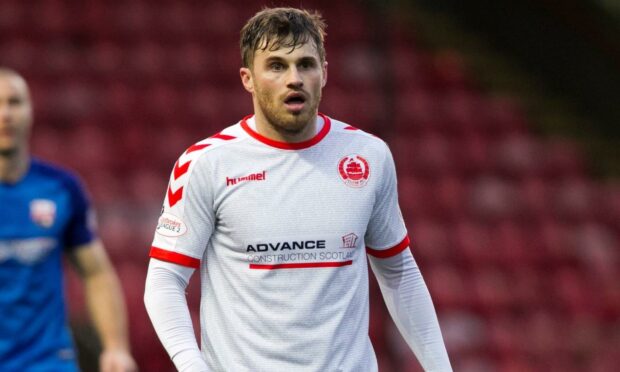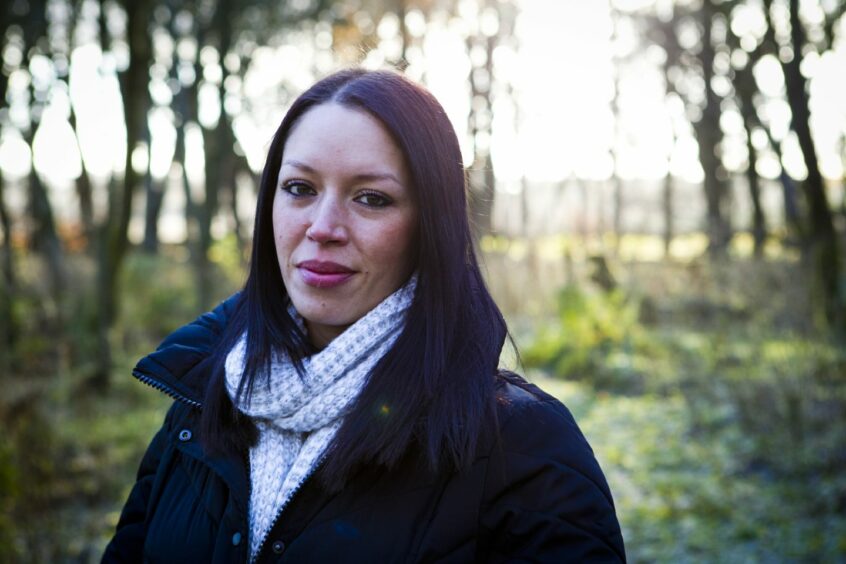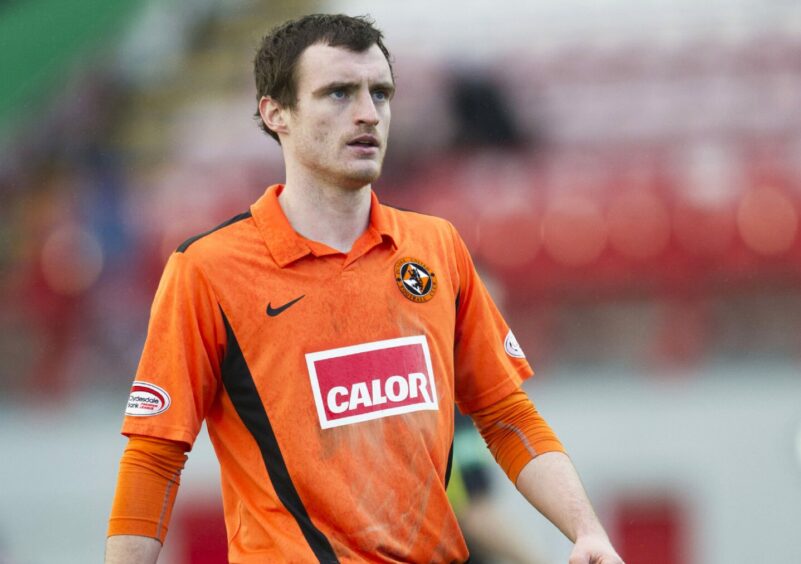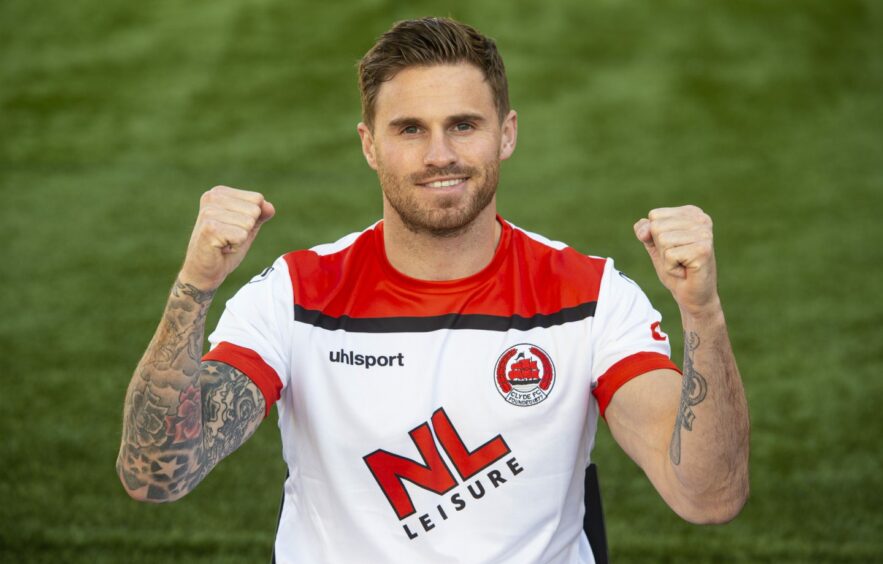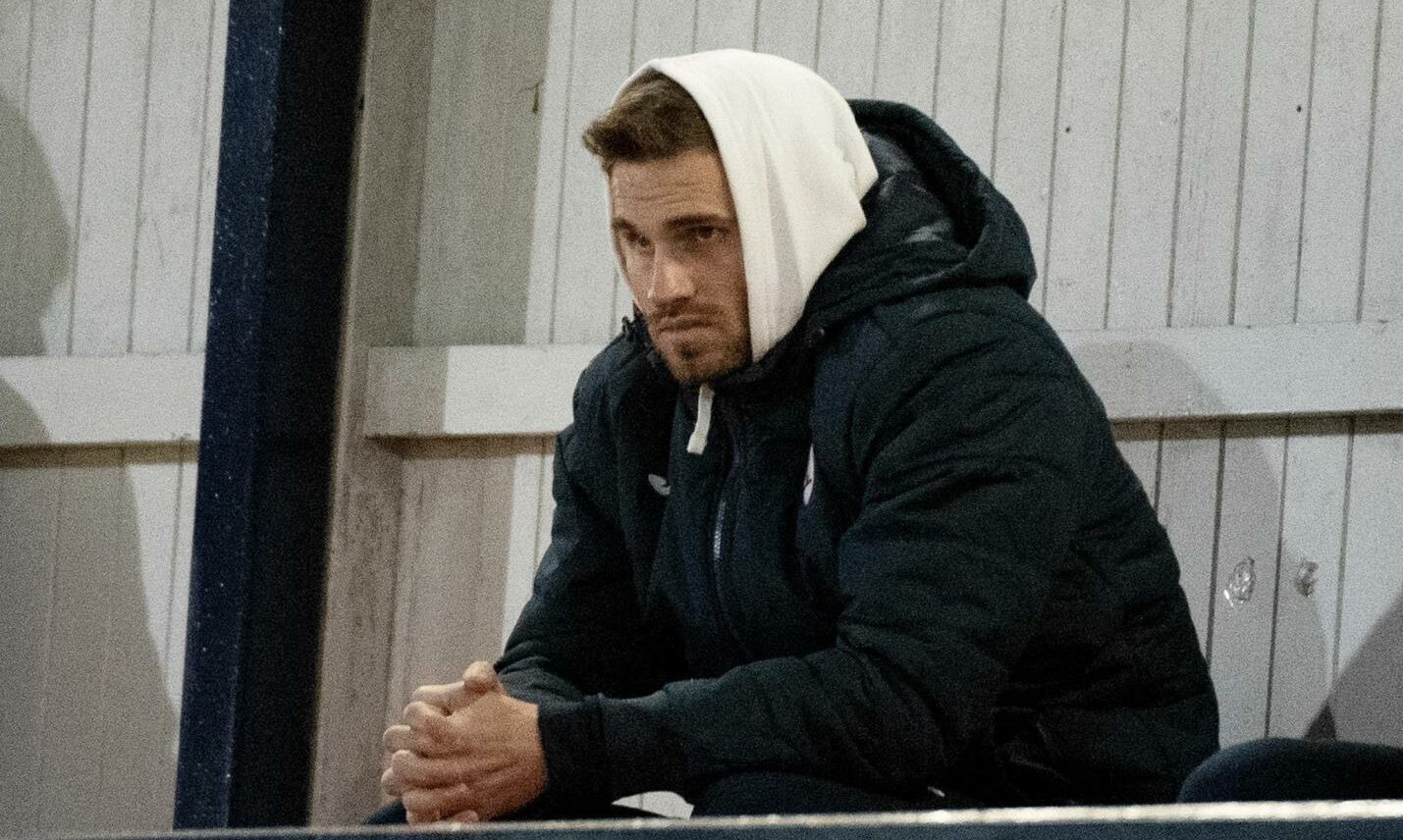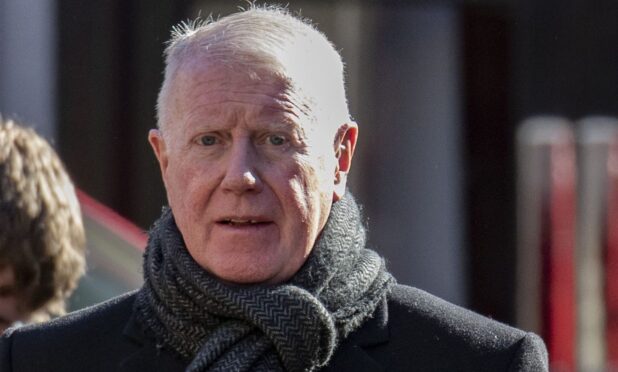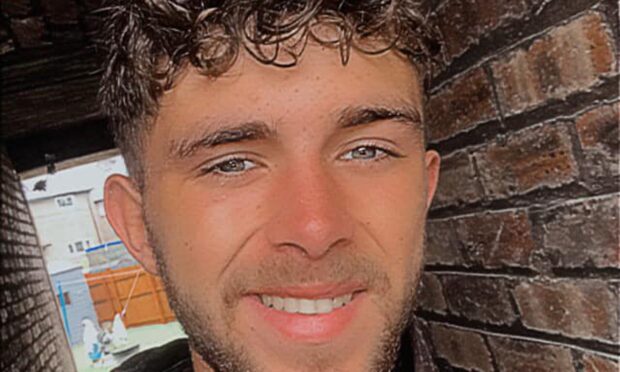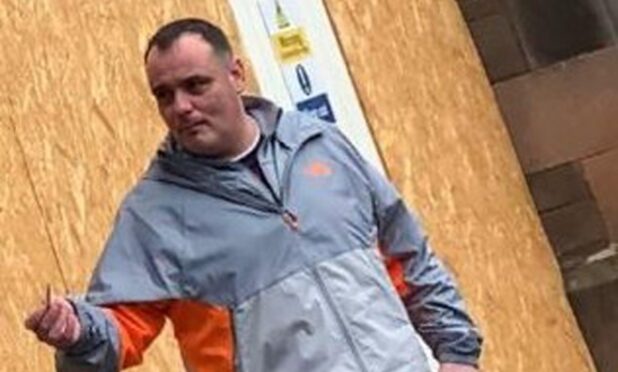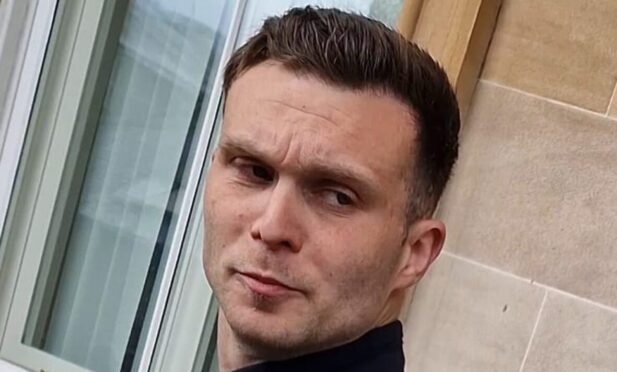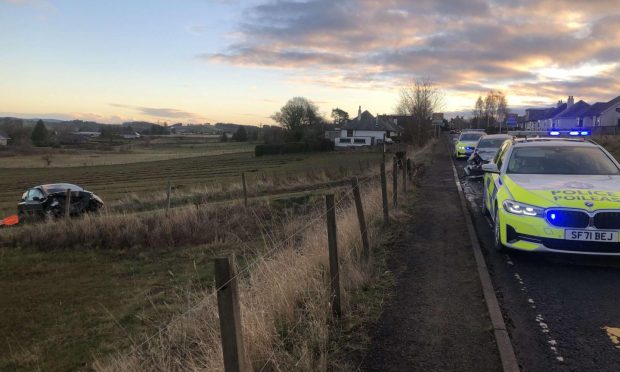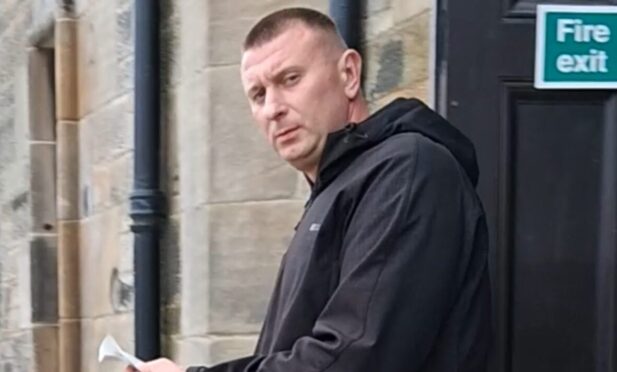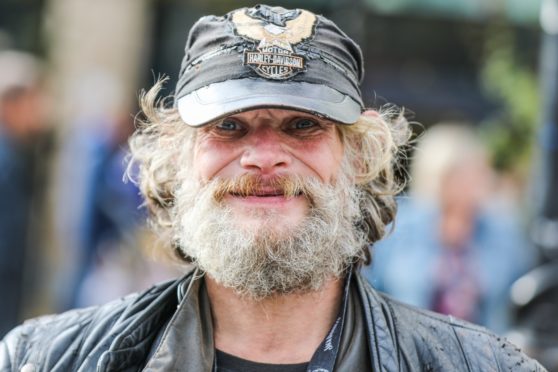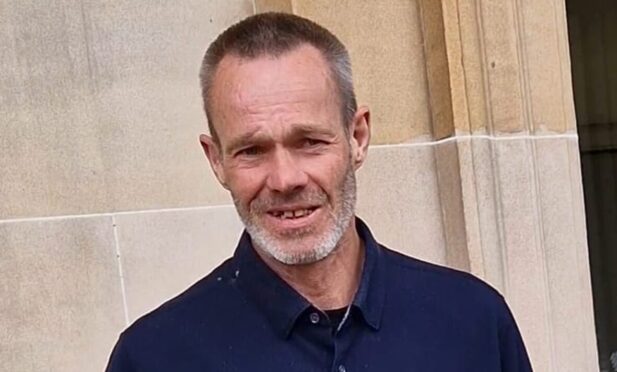David Goodwillie is one of the most controversial and divisive figures in Scottish football.
The Dundee United Scottish Cup winner spectacularly fell from grace when he, along with former team-mate David Robertson, was accused of raping Denise Clair, 24, after a night out in Bathgate.
While Robertson has dropped from public view since retiring from football in January 2017, one-time Scotland striker Goodwillie signed for Clyde three months after the case and remains in the spotlight.
His goal-scoring exploits saw him frequently linked with clubs playing at a higher level before he eventually signed for Raith Rovers on transfer deadline day.
The decision saw celebrity fan and shirt sponsor Val McDermid end her lifelong support of the club and prompted fan anger and multiple resignations.
And the backlash led to Rovers ripping up his contract in a dramatic U-turn, with chairman John Sim saying sorry for the scandal (an apology undermined in an April interview Sim did with The Courier’s Alan Temple).
Goodwillie was officially released from his Raith deal on September 30, 2022 – eight months after the controversy erupted.
Speaking publicly about the controversy for the first time, Ms Clair told The Sunday Post: “Of course people should be outraged and scandalised that a man like that was about to play for Raith Rovers but he has never stopped playing.
“He was picked for Clyde four days after judges rejected his appeal and confirmed he raped me.
“That was four years ago and that’s when people should have been outraged and scandalised.
“Or, going even further back, they should have been outraged and scandalised when the prosecution against him was dropped 10 years ago for reasons which have never been properly explained to me.”
Goodwillie returned to Clyde on loan on March 1, 2022, but the deal caused more outrage.
The playing squad and general manager of the Cumbernauld club’s women’s team quit while North Lanarkshire Council (NLC) banned Goodwillie from entering Broadwood Stadium.
Clyde’s agreement with NLC over the stadium was later terminated and they now play at Hamilton’s New Douglas Park.
Goodwillie has never been convicted in a criminal court but was branded a rapist during a civil court action five years ago.
This week Australian side Sorrento became the latest club to perform a U-turn on signing him after a fan backlash.
These are some of the key questions surrounding the case.
1 – Why were David Goodwillie and David Robertson never tried in a criminal court?
Goodwillie, then 21, and Robertson, 24, were accused of raping Denise Clair at a house in Armadale, West Lothian, after a night out in Bathgate on January 2, 2011.
The Crown said there was insufficient evidence to bring the case to court and the charges against Goodwillie were dropped.
Robertson, who had spells at St Johnstone and Cowdenbeath before quitting football, was never charged.
2 – What was the reaction to the decision?
A spokesman for the Crown Office said: “This case was looked at very carefully by Crown counsel who concluded that there was insufficient evidence in law to raise criminal proceedings.
“As a result no proceedings were instructed.”
Ms Clair said she was “devastated” by the Crown’s decision.
Former First Minister Jack McConnell demanded the Lord Advocate personally explain the decision to Ms Clair and called for a full case review.
Despite the prosecutors’ stance, the Criminal Injuries Compensation Authority determined she had been raped and awarded her £11,000.
After the civil judgement in 2017, the Crown Office issued a statement to the Sunday Mail newspaper.
It read: “This case, as with all cases involving allegations of rape, was considered by Crown Counsel, the most senior lawyers at Crown Office who make decisions in serious cases and advise procurators fiscal on complex or sensitive issues.
“This case was looked at very carefully by Crown Counsel, who concluded there was insufficient evidence in law to raise criminal proceedings.
“As a result no proceedings were instructed.
“As Lord Armstrong stated in his judgment, the standard of proof to be satisfied was that of the balance of probabilities, which is a less onerous requirement than the standard in criminal cases, which is ‘beyond reasonable doubt’.
“Further, there is no requirement of corroboration in civil cases, unlike in criminal cases.”
3 — Was happened after Crown Office decision?
Ms Clair decided to sue Goodwillie and Robertson in a civil action.
It was the first civil rape case of its kind in Scotland.
The civil court carries a lower burden of proof than the criminal – the case needed to be proven to a judge on the balance of probabilities.
In a criminal court, a jury would have to be persuaded of Goodwillie’s guilt beyond reasonable doubt.
Ms Clair was seeking £500,000 damages from the pair.
4 – What happened at the civil hearing?
Lord Armstrong, presiding, heard from 20 witnesses.
The case hinged on whether Ms Clair was too drunk to give consent to have sex with the players.
Goodwillie and Robertson admitted having sex but said it was consensual.
Witnesses testified to Ms Clair being extremely drunk when she left a club in a taxi with the pair.
Security employee Gayle McGregor said she considered phoning an ambulance for Ms Clair but Robertson insisted he would take her home, with Ms McGregor telling him to call 999 if Ms Clair fell unconscious.
Taxi driver Billy McNeill was interviewed twice by police about the case and also gave a statement to solicitors in the civil case.
In 2014, he told the Sunday Mail Ms Clair “seemed uneasy”.
Mr McNeill added: “They eventually told me an address in Greig Crescent.
“When we got there, I really thought this was not a normal party. The house was in darkness.
“In my opinion, I didn’t think she wanted to be in the taxi.
“I definitely don’t think she wanted to go with them to the house. She stayed in the back of the taxi for a while.”
Medical and forensic witnesses backed Ms Clair’s story.
Lord Armstrong ruled Ms Clair had been raped and awarded her around £100,000 in damages.
5 – What did Lord Armstrong say about evidence given by Denise Clair, David Goodwillie and David Robertson?
The judge was scathing of the players’ testimony.
Of Goodwillie, he said: “My general impression was that, particularly in relation to his assessment of the pursuer’s condition, his evidence was given with a view to his own interests rather than in accordance with the oath which he had taken.
“I did not find his evidence to be persuasive.”
Robertson was slammed as “selective as to what he was prepared to tell the court”.
Lord Armstrong said his evidence “directed as it was entirely to his own interests, was partial and partisan.”
On the other hand, Ms Clair was “cogent, persuasive and compelling”.
Lord Armstrong went on: “Both defenders took advantage of the pursuer when she was vulnerable through an excessive intake of alcohol and, because her cognitive functioning and decision‑making processes were so impaired, was incapable of giving meaningful consent; and that they each raped her.”
6 – Why did Denise Clair waive her anonymity and was she offered money to drop the case?
Ms Clair waived her legal and lifelong right to anonymity in 2013 to slam the justice system.
After winning the civil case, she spoke again of her devastation that the matter had never reached the criminal courts.
She also revealed lawyers for the footballers had offered her up to £115,000 to drop the case.
Ms Clair later told how she did not expect to see any of the money due her, with legal costs swallowing the settlement.
Goodwillie was declared bankrupt in 2018.
7 – What did Clyde FC say about signing Goodwillie just three months after civil hearing?
Goodwillie had moved from Dundee United to Blackburn Rovers after the rape and had spells with a range of clubs – including a loan return to Dundee United and Aberdeen.
He was at Plymouth Argyle during the court case and said at one stage he would quit football to concentrate on an appeal.
However, he returned to part-time Clyde in April 2017.
Chairman Norrie Innes said the Scottish League Two club was “seeking to help someone when others want to punish him”.
He added: “There is no positive purpose or societal gain whatsoever to wish ill on him and allow his talents to stagnate and waste.”
Goodwillie went on to score more than 100 goals in nearly 176 appearances for Clyde.
8 – Has Goodwillie ever spoken in the media about the case?
Yes. After the decision was made to drop the criminal case in 2011, he told The Scotsman: “It had been total and utter hell, the worst moments of my life. It was a dark time.
“My life stopped after the accusation was made.
“It’s the end of the world when something like that happens to you.”
Speaking after his bankruptcy hearing in 2019, he said: “I’ve got nothing — I haven’t got a house, I’ve got a banger of a car, I haven’t got any assets — and I’ve got to provide for my wife and baby.”
9 – How did Goodwillie end up signing for Raith Rovers?
Raith Rovers boss John McGlynn – who managed Goodwillie during the 2007/08 campaign when the striker had a loan spell at Stark’s Park – was asked about the prospect of signing him after the Fife derby against Dunfermline on January 2.
McGlynn replied: “I’m not going to get dragged into that.”
After the signing was confirmed, McGlynn told Rovers’ official website: “I have worked with David before and he has a proven track record as a goal-scorer throughout his career at every level.
“We know from matches against Clyde in League One that he always carried a goal threat.
“Signing him, I believe, is crucial to the club’s promotion push in our quest to reach the SPFL Premiership – it is a great signing for Raith Rovers as a club, as David is the top goal-scorer in Scotland.
“Every striker at the club will benefit greatly from his experience in matches and training.”
Addressing the fan backlash a day later, Raith Rovers defended the move and said Goodwillie’s footballing ability was the club’s “foremost consideration”.
Following the club’s 3-3 draw with Queen of the South at Stark’s Park – where Goodwillie was in the stand watching his new team-mates – McGlynn was asked about the situation.
He said: “The club has issued a statement which speaks for itself. It’s a club statement and decision.
“As a football manager, all you can do is try and concentrate on the game and that’s exactly what we’ve done.
“Anyone who knows me, knows that I am football all day long.
“And we believe that we needed a goal-scorer.
“When you sign the top scorer in Scotland — a proven scorer — that’s why we make that decision.”
Asked directly if he had a message for those who feel unable to support the club following the signing, McGlynn simply said: “All I can say is: I understand.”
But then on Thursday February 3, after two full days of outrage and with the story covered across the world, Raith Rovers said sorry and confirmed they were in negotiations to cancel Goodwillie’s contract.
‘We got it wrong’
Chairman John Sim said: “I firstly want to apologise wholeheartedly to our fans, sponsors, players and the wider Raith Rovers community for the anguish and anger caused over the past few days.
“We got it wrong. In reaching our original decision, we focused far too much on football matters and not enough on what this decision would mean for our club and the community as a whole.”
Raith Rovers Women and Girls, led by captain Tyler Rattray, would go on to sever all ties with the Stark’s Park outfit and change their name to McDermid Ladies.
Sim’s apology was later undermined by comments he made – sympathetic to Goodwillie – in an April interview with The Courier’s Alan Temple.
He said: “I’m appalled by the reaction to it and, initially, my reaction was, ‘well, if he can’t play for the club, let’s close the club’.
“I didn’t think it was fair.
“The guy has been playing at Clyde for years. He’s been coaching, been their captain and won player of the month awards.
“Surely you need to move on and let the guy pick up the pieces.
“How much do you punish someone? Since I’ve been knee-high to a grasshopper, I’ve believed in forgiving but not necessarily forgetting.
“I feel for David, and I feel for his wife and daughter.”
10 – Has David Goodwillie paid damages to Denise Clair?
David Goodwillie and David Robertson haven’t paid a penny out of the £100,000 court-ordered compensation.
According to The Sunday Post, Goodwillie was discharged from bankruptcy days before joining Raith, while Robertson’s trustees are understood to be in the process of discharging him.
Ms Clair said: “I knew what they would do but it was never about money for me.
“The only thing I truly wanted was to see them behind bars for what they did to me.
She added: “I don’t care about the money but they should have been forced to pay me something, anything, a penny, every week for the rest of their lives so they would never forget what they did.”
11 – Did David Goodwillie have to pay Denise Clair court-ordered damages when he received Raith Rovers pay-off?
No. Goodwillie was expected to receive a six-figure pay-off from Raith following the Kirkcaldy club’s U-turn on the decision to sign him.
Speaking to The Courier, Susan Currie (Senior Solicitor, Dispute Resolution) of Blackadders LLP explained the complexities around the bankruptcy process and how they impact on this particular case.
She said: “Working on the premise that the debtor has not been paid, generally speaking, if David Goodwillie had not been sequestrated, the decree against him would be enforceable for 20 years.
“This means the creditor who obtained the decree can seek to enforce it for a period of 20 years. An award of sequestration changes this however.
“Any pre-sequestration debts are essentially written off once the debtor is discharged from his/her sequestration.
“This is effectively to allow debtors to have a ‘fresh start’.
“There are some exemptions and some debts survive the sequestration, e.g. student loans and debts which arose as a result of fraud.
“The debt in the present case relates to an award of damages and so would be written off after discharge of the debtor.
“In order for the individual that has decree against David Goodwillie to receive some form of payment, she would have needed to rank as a creditor in the sequestration.
“The trustee in sequestration has the role of ingathering the estate and paying out any dividend in accordance with an order contained in legislation.
“Secured creditors are paid first and then the costs of the sequestration process are met.
“If there is any money left then ordinary, unsecured creditors might receive a dividend of X pence in the pound.
“A creditor with a court decree is not preferred to other unsecured creditors without a decree (the decree simply provides evidence of the debt).
“In some circumstances, the sequestrated individual can be required to pay a debtor contribution order where there is excess income over expenditure and the money paid as a result of that order is put into the ‘pot’ and might result in a dividend being paid to creditors.
“The Trustee would apply for such an order, not the creditor and again the creditor with a decree would have no preference for payment from any monies ingathered from that order.
“In short, any income received after the discharge from sequestration – including any potential pay-out from Raith Rovers – would go to David Goodwillie and not to pre-sequestration creditors.”
